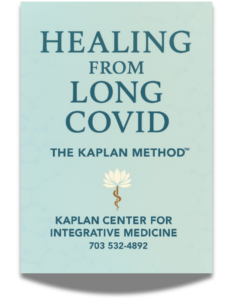Long-COVID Syndrome
If you have recovered from a COVID-19 infection but continue to experience symptoms weeks or months after the original infection, you might be dealing with Long-COVID Syndrome.
Long-COVID, also known as “long-hauler COVID,” “post-COVID,” or “chronic COVID,” is a complex, multifaceted condition that continues to baffle the medical community. It occurs after the acute phase of a COVID-19 infection and can persist for months or even years, with symptoms that can severely impact a person’s quality of life. Unlike the initial infection, which is usually confined to respiratory symptoms, Long-COVID has a broad spectrum of signs and symptoms affecting multiple organ systems.
Watch Now – Let’s Talk Long COVID Webinar Series
What We Know About Long-COVID Syndrome
There is still a lot we are learning about Long-COVID, such as why certain people get it or how long the condition will last. Researchers will continue the search for answers to these questions but for now, much remains unknown. What we do know is:
- Long-COVID affects approximately 10-30% of those who get COVID-19
- Long-COVID can follow a mild or severe COVID-19 infection
- Long-COVID can itself be mild or severe
- Long-COVID can affects multiple body systems
- Long-COVID can follow immediately after the acute infection or may appear weeks to months later
- Long-COVID affects all ages, sexes and ethnicity groups
- Long-COVID can exacerbate a preexisting health condition
- Long-COVID can have profound impact on a patient’s quality of life
Read: Living in the Shadow of COVID-19: The Persistent Struggle with Long-COVID –>>
Symptoms of Long-COVID Syndrome
Because Long-COVID Syndrome is a multi-system disease, it can cause problems with your gastrointestinal tract, your neurological system, pulmonary system, or your cardiovascular system. The most commonly reported symptoms include:
- Difficulty thinking or concentrating (“brain fog”)
- Mood changes
- Change in smell or taste
- Headache
- Sleep disturbance
- Pins-and-needles feeling
- Dizziness on standing (lightheadedness)
- Fever
- Tiredness or fatigue
- Joint or muscle pain
- Diarrhea/Gas/bloating
- Stomach pain
- Difficulty breathing or shortness of breath
- Chest pain
- Cough
- Rash
- Fast-beating or pounding heart (also known as heart palpitations)
Call 703-584-7594 now to see if you would benefit from a comprehensive appointment with The Kaplan Center.
Long-COVID Fatigue
Chronic fatigue is one of the most significant manifestations that we see in the highest percentage of people who have Long-COVID Syndrome and can be particularly hard to overcome. Some who have recovered from COVID-19 have gone on to develop ME/CFS, a disorder characterized by extreme fatigue and tiredness.
Diagnosing Long-COVID Syndrome
The Kaplan Method™
35 years of experience in diagnosing and treating patients with complex, chronic conditions has helped Dr. Kaplan and his team create The Kaplan Method™ a structured, personalized, precision-based program designed to uncover and reverse the root causes of chronic illness by healing the immune system–an approach especially effective in diagnosing and treating Long COVID.
The diagnosis of Long COVID Syndrome may have taken some individuals through a difficult journey. Sufferers of Long COVID may have experienced misdiagnosis, due to the similarity of its symptoms to other illnesses, or indifference, leaving the patient to endure symptoms with the hope they will resolve on their own.
At the Kaplan Center, our providers will take a thorough medical history and explore the onset of physical symptoms while equally considering an individual’s emotional well-being. We will ask you about previous illnesses and consider how your immune system may have previously been damaged in the past. We may explore possible exposure to toxins or heavy metals. We may also ask questions about how well your gastrointestinal system is functioning. All this information will give us a better understanding of your health to determine whether your symptoms solely due to COVID or if underlying illness may be contributing.
Other tests that may be carried out:
- Blood tests – this includes looking for certain biomarkers or elements within the blood that may reflect any damage to the immune system.
- An evaluation of minerals and vitamins – to look for low levels of these nutrients.
- Digestive tests – to help determine if there are pre-existing digestive issues.
This combination of medical history, physical examination and diagnostic tests will be used to guide our diagnosis and put together a unique comprehensive and structured treatment plan for you.
Like other complex chronic illnesses, Long COVID causes a wide range of new, returning, or ongoing health problems which can quickly derail your life. But we want to assure you that you are not alone and there is hope.
Treating a multi-system condition, like Long COVID Syndrome requires a multi-dimensional treatment plan. Because recovering from COVID-19 is different for every patient, we’ll devise an individualized treatment plan that includes the best evidence-based therapies to address your symptoms and make sure all of your concerns are understood. Our decades of experience in dealing with other multi-system illnesses puts us in the best position to help you cope with your symptoms and recover from Long COVID Syndrome.
Our services include the lab services of Dr. Bruce Patterson, former Head of Virology at Stanford University and now head of IncellDx, who has developed a unique method to identify “long haulers.” Dr. Patterson has identified specific biomarkers‑tests within the blood that help us understand what part of the immune system has been damaged in Long-COVID Syndrome. Dr. Patterson’s research provides critical insight into how to predict, identify, and treat patients who are affected by Long-COVID Syndrome. More specifically, he believes he’s identified one specific type of white cell that becomes damaged by the SARS-CoV-2 virus.
Comprehensive Treatment Modalities
Recognizing that Long-COVID can affect virtually any system in the body, the center utilizes a variety of therapeutic modalities, including:
– Prescription Rx
– Nutritional Supplements – The right supplements will support your immune function, brain health, detox, nervous system and more.
– Nutritional Counseling – Certain diets can help lower ongoing inflammation that is thought to be a key cause of long COVID symptoms. A Nutritionist will help you find the diet most appropriate for your medical condition. There is some evidence to suggest that adoption of a plant-based diet leads to reduced intake of inflammatory mediators and higher consumption of phytonutrients that reduce the inflammation in the body and help facilitate health and healing. Addressing some aspects of our diet can help to tackle long-COVID associated inflammation. Read more about Nutrition and Long-COVID here.
– Therapeutic Plasma Exchange (TPE) – Also known as plasmapheresis, TPE is has shown promise in reducing key biomarkers that may be part of post-infectious syndromes like Long COVID.
– Acupuncture – Acupuncture has shown to inhibit the production of pro-inflammatory cytokines. Benefits include reduced inflammation, better nervous system and immune function, and lower stress levels.
– IV Therapy – We’ll restore vitamin and mineral deficiencies that may be weakening your immune system.
– Physical Therapy – Our physical therapists will select specific exercises, tailored to your needs, to target any musculoskeletal weaknesses or deficiencies.




